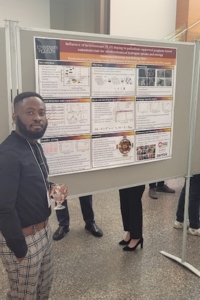PhD. Chemistry student wins 2nd place for research in hydrogen storage.

Emmanuel Boateng’s poster competed at the Spring Symposium of the Canadian Section of The Electrochemical Society held at the Queen's University last month. His work entitled, "Design and Electrochemical Study of Three-Dimensional Graphene-Based Materials Decorated with Pd Nanoparticles for Hydrogen Storage" won 2nd place; this work has also been published in The Journal of Physical Chemistry C.
The research supports a future hydrogen economy enabling global energy security by tackling one of the biggest challenges: hydrogen storage. Moving hydrogen to the forefront of the energy sector could be a game changer in the fight against global warming. Hydrogen offers high energy output and zero-carbon emissions. Current storage options include compressed gas at high pressure or as liquid at cryogenic temperatures, both of which have challenges for logistics and commercial applications.

Emmanuel shares that “From the cost and safety perspective, solid-state hydrogen storage is preferred over the conventional storage methods. My PhD research focuses on the development of novel graphene-based materials modified with palladium nanoparticles for efficient hydrogen storage.” If the research is successful, enhanced storage capacity at moderate temperature and atmospheric pressure will be ideal for commercialization. Emmanuel “hopes the concepts and strategies being developed will greatly contribute toward future solid-state material designs for a sustainable hydrogen economy.”
An earlier publication in Materials Today Advances titled “Recent advances in nanomaterial-based solid-state hydrogen storage” by Emmanuel and Professor Aicheng Chen is listed as the most cited article published in the journal over the past three years. Clearly hydrogen storage is top of mind.